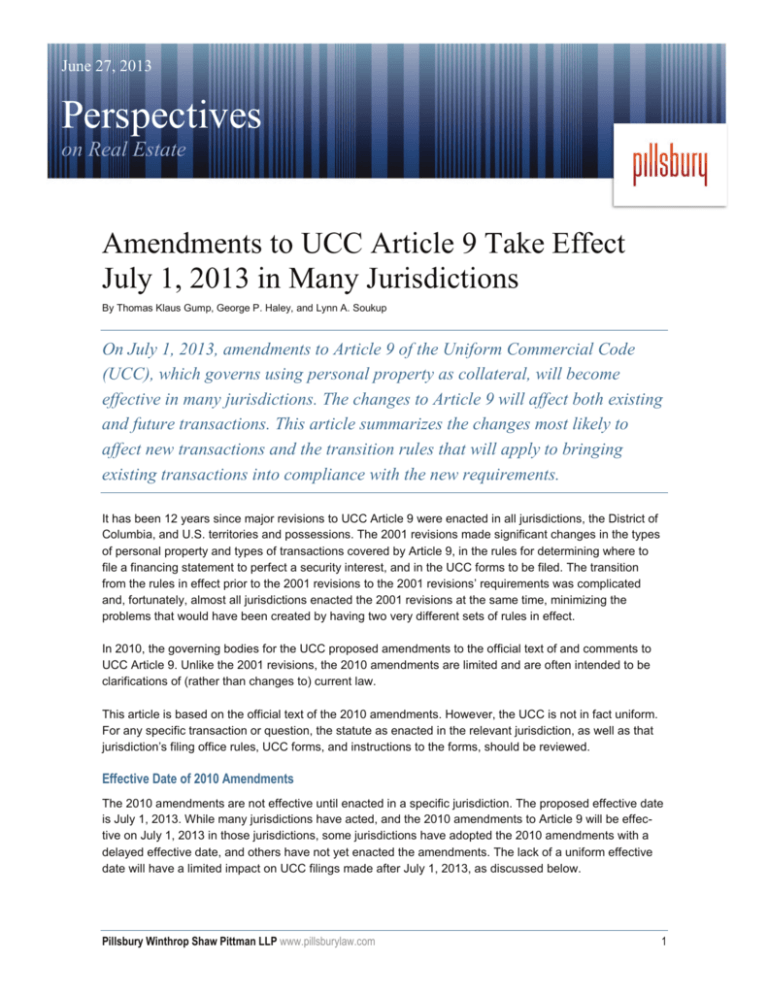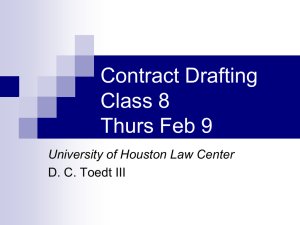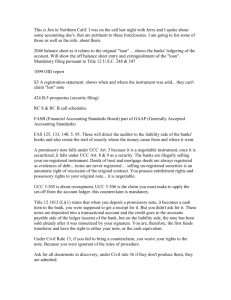
Perspectives on Real Estate
June 27, 2013
June 27, 2013
Perspectives
on Real Estate
Amendments to UCC Article 9 Take Effect
July 1, 2013 in Many Jurisdictions
By Thomas Klaus Gump, George P. Haley, and Lynn A. Soukup
On July 1, 2013, amendments to Article 9 of the Uniform Commercial Code
(UCC), which governs using personal property as collateral, will become
effective in many jurisdictions. The changes to Article 9 will affect both existing
and future transactions. This article summarizes the changes most likely to
affect new transactions and the transition rules that will apply to bringing
existing transactions into compliance with the new requirements.
It has been 12 years since major revisions to UCC Article 9 were enacted in all jurisdictions, the District of
Columbia, and U.S. territories and possessions. The 2001 revisions made significant changes in the types
of personal property and types of transactions covered by Article 9, in the rules for determining where to
file a financing statement to perfect a security interest, and in the UCC forms to be filed. The transition
from the rules in effect prior to the 2001 revisions to the 2001 revisions’ requirements was complicated
and, fortunately, almost all jurisdictions enacted the 2001 revisions at the same time, minimizing the
problems that would have been created by having two very different sets of rules in effect.
In 2010, the governing bodies for the UCC proposed amendments to the official text of and comments to
UCC Article 9. Unlike the 2001 revisions, the 2010 amendments are limited and are often intended to be
clarifications of (rather than changes to) current law.
This article is based on the official text of the 2010 amendments. However, the UCC is not in fact uniform.
For any specific transaction or question, the statute as enacted in the relevant jurisdiction, as well as that
jurisdiction’s filing office rules, UCC forms, and instructions to the forms, should be reviewed.
Effective Date of 2010 Amendments
The 2010 amendments are not effective until enacted in a specific jurisdiction. The proposed effective date
is July 1, 2013. While many jurisdictions have acted, and the 2010 amendments to Article 9 will be effective on July 1, 2013 in those jurisdictions, some jurisdictions have adopted the 2010 amendments with a
delayed effective date, and others have not yet enacted the amendments. The lack of a uniform effective
date will have a limited impact on UCC filings made after July 1, 2013, as discussed below.
Pillsbury Winthrop Shaw Pittman LLP www.pillsburylaw.com
1
Perspectives on Real Estate
June 27, 2013
Changes Affecting Transactions
The provisions of the 2010 amendments that will have the most effect on transactions relate to UCC filings.
Registered organizations. The 2010 amendments will broaden the definition of registered organization
(found in UCC 9-102) to provide that common law trusts that are formed for business purposes and
required to file formation documents with their jurisdiction of formation (such as a Massachusetts business
trust) are registered organizations and to confirm that statutory trusts are registered organizations. This
change in the definition will in turn affect where a financing statement is required to be filed for such a trust
due to the rules (found in UCC 9-301, 9-305(c) and 9-307) that apply differently to a registered organization (file in jurisdiction of organization) and to an organization that is not a registered organization (file in
jurisdiction where the chief executive office is located). Because the 2010 amendments will not be in effect
in all jurisdictions on July 1, 2013, in new transactions this change may require filing in both jurisdictions
(chief executive office and organization) as to these types of trusts until all jurisdictions have the 2010
amendments in effect. For existing transactions, this change may trigger the need to take action to
maintain perfection under the transition rules, as described below.
Debtor name – individuals. Because of uncertainties created by case law as to the correct name of an
individual debtor, and the resulting non-uniform provisions on individual debtor names that were enacted in
several jurisdictions, one of the major reasons for the 2010 amendments is to provide clearer rules on the
correct name of an individual. The 2010 amendments provide two alternatives for a jurisdiction to choose
from on this issue.
Most jurisdictions have adopted “Alternative A,” which requires that the name appearing on a qualifying
driver’s license (or other qualifying state-issued identification card) be used as the debtor’s name. Only if
there is no qualifying license/identification card is an alternative (the individual’s surname and first
personal name or the “individual name” of the debtor) sufficient. A qualifying license/identification card is
the most recently issued unexpired license/identification card issued by the jurisdiction in which the UCC
filing is being made. The use of the name on the license/identification card still leaves a number of
questions for those preparing UCC filings to address, including how the name on the
license/identification card is used to fill in the fields on the UCC form (e.g., identifying the surname, first
personal name, and other names and initials), what to do if the license/identification card contains
characters that are not permitted by the UCC filing system, the name to use if the filing jurisdiction is
different from the license/identification card jurisdiction, and how to monitor changes (such as license
expiration) in the individual debtor’s name that may require an amendment to an existing UCC filing to
protect the security interest. In an Alternative A jurisdiction, UCC 9-502 will provide that a mortgage or
deed of trust as a fixture filing need only show the individual’s surname and first personal name or the
“individual name” of the debtor.
A smaller number of jurisdictions have adopted “Alternative B,” which provides that any of the qualifying
license/identification card name, the surname and first personal name, or the “individual name” of the
debtor is sufficient. While Alternative B raises many of the same issues as Alternative A, it may be more
forgiving in that it offers the secured party multiple paths to achieve the benefits of its bargained for
perfection.
Note that non-UCC liens (e.g., federal tax liens) generally have not been required to meet the UCC
requirements as to correct debtor names, which should be taken into account in searching non-UCC
records for liens.
Debtor name – registered organizations. The rules in UCC 9-503 have been changed to specify that the
public record used to determine the correct name of a registered organization (such as a corporation, LLC
or limited partnership) is the name in its organizational document (as amended) as filed with its jurisdiction
of organization. Other public records, such as online databases, assumed name filings, and good standing
certificates, which may contain a different name, are not the correct source.
Pillsbury Winthrop Shaw Pittman LLP www.pillsburylaw.com
2
Perspectives on Real Estate
June 27, 2013
Changes to forms. The 2010 amendments made some changes to the UCC forms. The changes that are
most likely to cause errors in new filings are:
UCC-1 (initial financing statement). The box to check to indicate that a filing is to be recorded in the real
property records (e.g., as a fixture filing) has been moved from the UCC-1 itself to the addendum form
(and grouped with other information relating to filings to be made in the real property records). The box
can easily be overlooked due to this move.
UCC-3 (amendments including terminations and continuations). The box to check to indicate that a filing
is to be continued has been moved, so that it is no longer directly below the box to be checked for a
termination.
UCC-5 (Information statement). The 2010 amendments will change UCC 9-518 to allow an information
statement (formerly called a correction statement) to be filed by either a debtor or by a secured party.
The filing continues to have no legal effect on a previous UCC filing and is just a way for a debtor or
secured party to place additional information on the public record (though they are not required to do
so).
The new forms should not be used in a jurisdiction where the 2010 amendments are not yet effective,
and the existing forms will generally be rejected by a jurisdiction once the 2010 amendments are in
effect in that jurisdiction (although some jurisdictions may have a limited transition period during which
both existing and new forms will be accepted). The relevant jurisdiction’s requirements should be
checked before filings are submitted.
Transition Rules
The changes in the definition of registered organization and in the debtor name rules will require that UCC
filings made before the 2010 amendments became effective in a jurisdiction be brought into compliance
with the 2010 amendments’ requirements. The good news is that this generally will not need to be done
until the existing filing is being continued or (in some cases) amended. The 2010 amendments also
provide a proposed outside date (July 1, 2018) by which filings made prior to the effectiveness of the 2010
amendments in a jurisdiction must be brought into compliance with the 2010 amendments’ requirements,
though some jurisdictions may provide for a longer period.
While the transition period is in effect, UCC searches will need to take into account the place of filing and
name rules under both the pre-2010 amendments and 2010 amendments versions of Article 9.
Conclusion
While the 2010 amendments have limited effects on Article 9 of the UCC, there are some changes that
affect existing and future transactions. Changes in the UCC forms, the new registered organization definition (and its effect on where to file against certain types of entities), the new debtor name rules, and the
transition requirements are the key elements of the 2010 amendments to be aware of and implement.
Thomas Klaus Gump is a Partner in Pillsbury’s San Francisco office. He can be reached at 415.983.1823
or at thomas.gump@pillsburylaw.com.
George P. Haley is a Partner in Pillsbury’s San Francisco office. He can be reached at 415.983.1272 or at
george.haley@pillsburylaw.com.
Lynn A. Soukup is a Partner in Pillsbury’s Washington, DC office. She can be reached at 202.663.8494 or
at lynn.soukup@pillsburylaw.com.
Pillsbury Winthrop Shaw Pittman LLP www.pillsburylaw.com
3
Perspectives on Real Estate
June 27, 2013
About Pillsbury
Pillsbury is a full-service law firm with a keen industry focus on the energy and natural resources, financial
services, real estate and construction, and technology sectors. Based in the world’s major financial,
technology and energy centers, Pillsbury counsels clients on global regulatory, litigation, and corporate
matters. We work in multidisciplinary teams that allow us to anticipate trends and bring a 360-degree
perspective to complex business and legal issues—helping clients to take greater advantage of new
opportunities and better mitigate risk. This collaborative work style helps produce the results our clients
seek.
Pillsbury provides legal services to real estate professionals around the globe.
To learn more, visit us at www.pillsburylaw.com/realestate
Practice Section Leader
Robert C. Herr
+1.415.983.1038
robert.herr@pillsburylaw.com
Editorial Staff
Peter G. Freeman, Editor-in-Chief
James S. Lloyd and Noa L. Clark, Editors
For mailing list inquiries, please email real.estate@pillsburylaw.com
Pillsbury Winthrop Shaw Pittman LLP | 1540 Broadway | New York, NY 10036 | 877.323.4171 | www.pillsburylaw.com
ATTORNEY ADVERTISING. This may be considered advertising under the rules of some states. The hiring of a lawyer is an
important decision that should not be based solely upon advertisements. Furthermore, prior results, like those described in this
newsletter, cannot and do not guarantee or predict a similar outcome with respect to any future matter, including yours, that we
or any lawyer may be retained to handle. Not all photos used portray actual firm clients. The information presented is only of a
general nature, is intended simply as background material, is current only as of its indicated date and omits many details and
special rules and accordingly cannot be regarded as legal or tax advice. The information presented is not intended to constitute
a complete analysis of all tax considerations. Internal Revenue Service regulations generally provide that, for the purpose of
avoiding United States federal tax penalties, a taxpayer may rely only on formal written opinions meeting specific regulatory
requirements. The information presented does not meet those requirements. Accordingly, the information presented was not
intended or written to be used, and a taxpayer cannot use it, for the purpose of avoiding United States federal or other tax
penalties or for the purpose of promoting, marketing or recommending to another party any tax-related matters.
© 2013 Pillsbury Winthrop Shaw Pittman LLP. All rights reserved.
Pillsbury Winthrop Shaw Pittman LLP www.pillsburylaw.com
4





